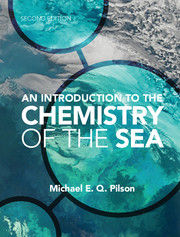Book contents
- Frontmatter
- Contents
- Preface
- Acknowledgments
- 1 Introduction
- 2 The water in seawater
- 3 Salinity, chlorinity, conductivity, and density
- 4 Major constituents of seawater
- 5 Simple gases
- 6 Salts in solution
- 7 Carbon dioxide
- 8 Nutrients
- 9 Trace metals and other minor elements
- 10 Radioactive clocks
- 11 Organic matter in the sea
- 12 Anoxic marine environments
- 13 Exchanges at the boundaries
- 14 Chemical extraction of useful substances from the sea
- 15 Geochemical history of the oceans
- Appendix A The chemical elements
- Appendix B Symbols, units, and nomenclature
- Appendix C Physical properties of seawater
- Appendix D Gases
- Appendix E Carbon dioxide
- Appendix F Dissociation constants and pH scales
- Appendix G Solubility of calcium carbonate
- Appendix H Effects of pressure
- Appendix I Radioactive decay
- Appendix J Geochemical reservoirs, and some rates
- Appendix K Sound absorption
- Epilogue
- Questions for chapters
- Glossary
- References
- Index
- Miscellaneous end matter
- References
11 - Organic matter in the sea
Published online by Cambridge University Press: 05 February 2013
- Frontmatter
- Contents
- Preface
- Acknowledgments
- 1 Introduction
- 2 The water in seawater
- 3 Salinity, chlorinity, conductivity, and density
- 4 Major constituents of seawater
- 5 Simple gases
- 6 Salts in solution
- 7 Carbon dioxide
- 8 Nutrients
- 9 Trace metals and other minor elements
- 10 Radioactive clocks
- 11 Organic matter in the sea
- 12 Anoxic marine environments
- 13 Exchanges at the boundaries
- 14 Chemical extraction of useful substances from the sea
- 15 Geochemical history of the oceans
- Appendix A The chemical elements
- Appendix B Symbols, units, and nomenclature
- Appendix C Physical properties of seawater
- Appendix D Gases
- Appendix E Carbon dioxide
- Appendix F Dissociation constants and pH scales
- Appendix G Solubility of calcium carbonate
- Appendix H Effects of pressure
- Appendix I Radioactive decay
- Appendix J Geochemical reservoirs, and some rates
- Appendix K Sound absorption
- Epilogue
- Questions for chapters
- Glossary
- References
- Index
- Miscellaneous end matter
- References
Summary
. . .organic chemistry appears to me like a primeval forest of the tropics, full of the most remarkable things.
Friedrich Wöhler 1835 in letter to J. J. BerzeliusThe presence of significant concentrations of organic substances dissolved or suspended in seawater has been known or guessed at for a very long time. As knowledge of organic chemical structures and techniques to isolate and identify such compounds developed, so did attempts to learn about the organic substances in seawater. Even in the nineteenth century, the existence of these substances in the sea caught the imagination of biologists and chemists. The importance of organic matter in affecting the chemical and biological attributes of seawater has become increasingly evident. However, the overwhelming amount of salt, the recalcitrant nature of much of the organic matter, and the low concentrations of recognizable individual organic compounds have all combined to leave us with yet a poor understanding of this evidently complex mixture of substances. Some organic matter, such as simple sugars and amino acids, must be recycled rapidly because these substances are easily absorbed and metabolized by bacteria. However, estimates of the age of deep-sea organic matter, from its content of 14C, show that some of it must be more than 6000 years old, long antedating the record of human observations of seawater. The nature of this very old organic matter is still a matter of speculation.
Even though we do not know the structures of much of the organic matter in seawater, it is still possible to trace some individual compounds with exquisite sensitivity. Much information can be obtained by examining the chemistry of these compounds and their isotopic composition; additionally, by examining organic substances in marine sediments, it is even possible to infer a great deal about the climate and patterns of productivity in years past.
- Type
- Chapter
- Information
- An Introduction to the Chemistry of the Sea , pp. 287 - 326Publisher: Cambridge University PressPrint publication year: 2012
References
- 1
- Cited by



